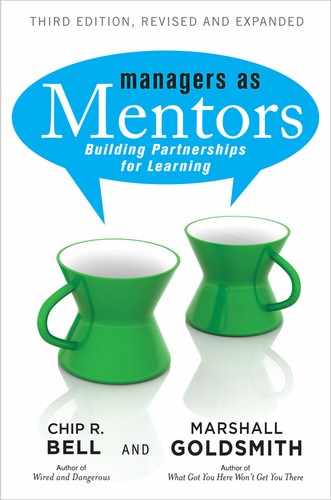A Drama in Four Steps
Now let’s put the steps together in a role play to illustrate the tone and technique of advice giving. Billy is a new reservations clerk for Mayday Airlines; Kay is his section leader. Mayday has just installed a new reservation system. Some of the features are similar to the old system on which Billy was an expert. Some of the steps can be done several ways. Kay has observed that Billy follows a mass-pull-sort approach on the new system, as he did on the old. She believes Billy’s efficiency would improve if he used a pull-mass-spread-sort approach.
Kay: “Billy, I’ve been impressed with your work. I’ve also noticed that your pace seems to slow when you use the mass-pull-sort approach.”
Billy: “Yes, I must admit I find doing it that way a lot more comfortable. I guess using it for ten years has something to do with it.”
Kay: “I know exactly what you mean. It was tough for me to let go of some of the older approaches, especially when I was evaluated on speed and shifting to a new approach would slow me down at first. I’ve been watching how you do it, and I have a suggestion that might help improve your speed over time.”
Billy: “Shoot. I’m all ears if it helps me get faster.”
Kay: “I found that the pull-mass-spread-sort approach, while awkward at first, gave me a lot more control over the reservation fields and was actually easier after a day or so than mass-pull-sort. I’ll be honest with you—if someone had just told me it would be easier, I wouldn’t have believed it. But I tried it and was really surprised. You might want to try it yourself.”
Billy: “Sounds all right. I’ll give it a try.”
And they all lived happily ever after, of course.
Giving advice is like playing pinball: only by pushing and pulling can you encourage the ball to go in a new direction and increase your score. But too much pushing and pulling can cause a tilt and stop the game. Effective mentors recognize the challenge of “teaching so it stays taught” and meet that challenge by coupling their wisdom with sensitivity. They keep the ball in play as long as they can by judicious application of pushes and pulls, nudges and bumps, building the score—the protégé’s competence.
Jack Gamble on Advice Giving
(“Mentoring In Action” Revisited)
Jack waited to make sure she had no more to say about the subject. “How can I help?” he asked, not wanting to assume anything yet about whether his assistance was required.
Tracy looked straight at him. “I guess I need you to be a sounding board, and maybe give me some ideas on how to get him fired up—or fired.”
“What do you think the problem is, based on what you know?” asked Jack.
“His morale is lousy. When I try to talk with him about his performance, his nonverbals are rather patronizing, like he’s offended that I raised the issue.”
Jack thought for a minute. “I can see that would be a tough nut to crack. I’ve never been really comfortable dealing with negative performers. It always makes me feel anxious if I have to get tough with an employee. I can see— ”
“But you still manage to get them turned around,” interrupted Tracy.
Jack could see that Tracy thought he had some magical secret he had kept to himself. “You believe there’s a special technique that maybe you’ve missed.”
“Yes, I suppose I do, in a way. You make it look easy. I remember when you had to terminate Edsel Joiner. The guy ended up thanking you for it!”
Jack did not respond for a while. Tracy suddenly felt awkward, as though she had allowed her stream of emotion to overflow its banks. Then, with unusual emotion in his voice, Jack said, “That was the scariest thing I’ve ever done since I came to work here.” They both sat in silence.
